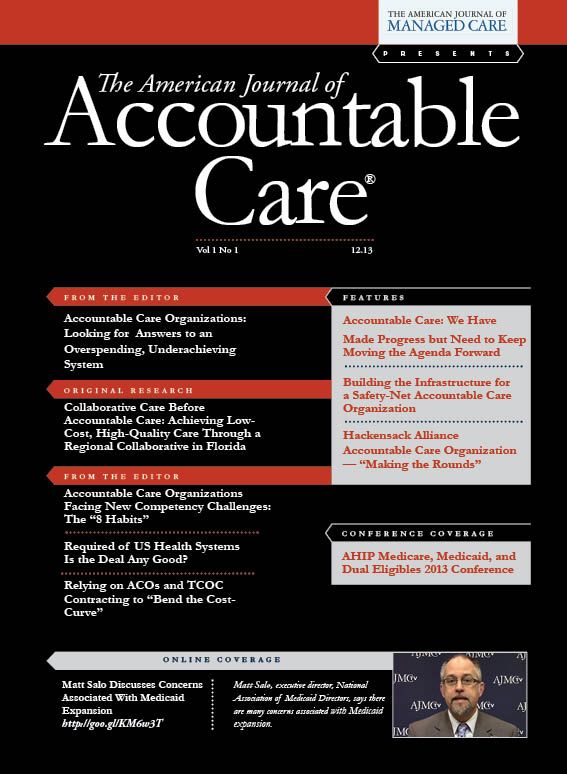- Center on Health Equity & Access
- Clinical
- Health Care Cost
- Health Care Delivery
- Insurance
- Policy
- Technology
- Value-Based Care
Accountable Care Organizations: Looking for Answers to an Overspending, Underachieving System
While the concurrent implementation and ongoing attempts to repeal the Patient Protection and Affordable Care Act (ie Obamacare) dominate headlines, 2 independent yet closely related storylines drive the national dialogue. The most prominent is the healthcare providers’ pursuit of the “triple aim,”1 which includes enhancing the care experience, improving population health, and reducing healthcare expenditures. Equally important is the changing face of the healthcare consumer as access to care grows, demographics change, and engagement increases. In this time of contention, there seems to be a growing consensus among stakeholders that the traditional, volume-based, fee-for-service (FFS) care is an untenable strategy to deliver evidence-based care that is both fiscally sustainable and able to meet the clinical needs of Americans. As we look for a solution to an overspending, underachieving system, the concept of “accountable care” has received much attention as a potential mechanism to better align provider financial incentives with high-quality care.
In light of these national trends and in response to multistakeholder
interest, The American Journal of Managed Care is pleased to launch The American Journal of Accountable Care. The content in this inaugural and future issues aims to highlight the opportunities and challenges faced by providers, payers, and patients as delivery systems, payment models, and consumer engagement initiatives are redesigned. Realizing that there is more than enough money in the system, we hope to steer the conversation from how much to how well we spend our healthcare dollars.
It is our hope and expectation that The American Journal of Accountable Care will address several important themes, including:
- Is the accountable care movement increasing the use evidence-based, high-value care? For example, the evidence is overwhelming that chronic care models can improve management of multiple chronic conditions (eg, diabetes, congestive heart failure, depression) and yet such models are rarely implemented in FFS settings. The populationbased approach of accountable care organization (ACO) payment could help provide resources up front to implement chronic care models. And, for the first time, reducing the volume and cost of clinical services through successful chronic care management would actually generate revenue for providers through shared savings.
- Are specific patient populations being left out of the accountable care movement? Before population-based models are implemented, someone has to determine the population for which the providers are accountable. The report by Perry et al2 on building infrastructure for a safety net ACO highlights the need to consider the experience of vulnerable populations in ACOs. Do patient attribution methods used by payers even capture vulnerable patients, who potentially have the most to gain from participation in an ACO?
- What aspects of ACO implementation are replicable in other settings? The reports in this issue by Patel2,3 and Perry highlight the fact that ACO implementation is proceeding with unique sets ofpatients, providers, and payers in diverse settings across the country.To what extent can the success or failure of a given ACO inform the efforts of other ACOs given their fundamental differences?
- What is the role of consumers in accountable care? While most of the discussion about ACOs has focused on the roles and responsibilities of payers and providers, success of accountable models will requireactive consumer participation. ACOs will need to work with patientsto develop common goals and be sure that consumer engagement initiatives (eg, benefit design, shared decision-making programs) match the needs of their aligned consumers.
- Where do public health initiatives fit into the accountable caremovement? Population health is largely driven by factors beyond the control of ACO payers and providers. Truly improving the health of an aligned population will require ACOs to move away from a purelymedical model.
And finally: What are the effects of accountable care on direct medical expenditures and the economy as a whole? Albert Einstein’s quote, “In the middle of difficulty lies opportunity,” is often applied to United States healthcare. While the accountable care movement will not—on its own—provide the cure for what ails healthcare in the United States, its implementation marks a critical step in the evolution of healthcare from volume to value. We intend that The American Journal of Accountable Care will promote innovative ideas and inform, stimulate, and advance the dialogue on the healthcare transformation process. We welcome your comments on the papers included in this issue and encourage submissions for future issues.Author Affiliations: From University of Michigan (AMF, DTM), Ann Arbor, MI; Center for Clinical Management Research, VA Ann Arbor Healthcare System, Ann Arbor, MI.
Author Disclosures: The authors report no relationship or financial interest with any entity that would pose a conflict of interest with the subject matter of this article.
Address correspondence to: Donovan T. Maust, MD, North Campus Research Complex, 2800 Plymouth Rd, Bldg 16, Room 217W, Ann Arbor, MI 48109-2800. E-mail: maustd@umich.edu.1. Berwick DM, Nolan TW, Whittington J. The triple aim: care, health, and cost.Health Aff (Millwood). 2008;27(3):759-769.
2. Perry RE. Building the infrastructure AJAC. 2013;1(1):13-14.
3. Patel K. Collaborative care before accountable care: achieving low cost, high quality care through a regional collaborative in Florida. AJAC. 2013;1(1):5-9.


